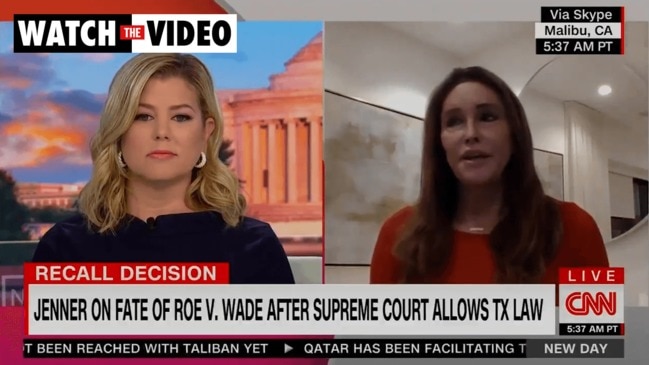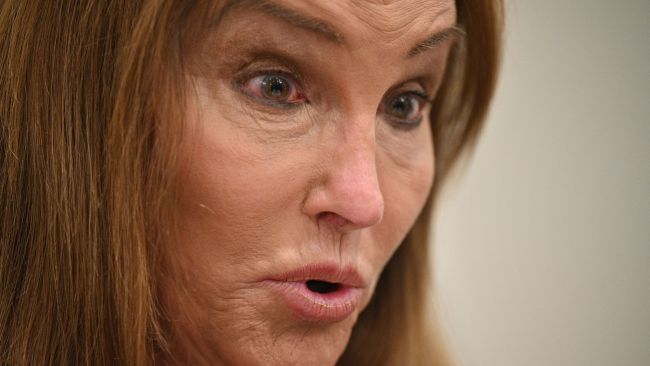Caitlyn Jenner says she supports Texas's decision to impose new anti-abortion law, even though she's pro-choice
Olympian and reality TV star turned political candidate Caitlyn Jenner was asked an awkward question on live TV this morning.

Caitlyn Jenner, the former Olympian and reality TV star currently running to be governor of California, delivered an interesting answer today when she was asked about a controversial law banning abortions after six weeks of pregnancy.
Jenner is one of several Republican candidates vying to replace the current Governor of America's largest state, Democrat Gavin Newsom, who faces a recall election on September 14. Voters will first say whether they wish to remove Mr Newsom from office, and if the answer to that is yes, they'll pick a replacement.
At the start of August, he appeared to be in a fair bit of trouble, with polls showing roughly equal support for keeping or removing him. Since then the danger appears to have receded. In the latest polling average, 53 per cent of Californians say they'd vote to keep Mr Newsom as Governor, compared to 43 per cent who would ditch him.
If the unexpected happens and voters do decide to replace Mr Newsom, Ms Jenner's fellow Republican Larry Elder is the frontrunner to replace him. He's consistently polling in the twenties, well ahead of his rivals. Ms Jenner is stuck at 1 per cent.
Still, the celebrity candidate has a high profile. And on Tuesday morning, US time, she went on CNN to make her case.

At one point in the interview, host Brianna Keilar asked Ms Jenner about the contentious anti-abortion law that went into effect in Texas last week.
The law, called S.B. 8, bans virtually all abortions from about six weeks of pregnancy, when a fetal heartbeat may first be detected.
Under legal precedent in the United States, going back to the landmark Supreme Court case Roe vs Wade in 1973, governments have been prevented from banning abortion before the point of fetal "viability", which is when the fetus can realistically survive outside the womb. That threshold is reached at about 23 or 24 weeks.
But last week the Supreme Court denied an emergency request from abortion providers for an injunction, which would have prevented Texas's law from being enforced while litigation continued in the lower courts. As a result, the law is now operating.
"Where are you? Do you think California should have a similar law?" Keilar asked.
"I am for a woman's right to choose. I am also for a state having the ability to make their own laws," Jenner replied.
"So I support Texas in that decision. That's their decision. I'm OK with that. But as far as being a woman's right to choose, I don't see any changes in our laws in California in the future."
Keilar, a little baffled by Ms Jenner's answer, followed up.
"But you're fine with the Texas law? Even though you say that you support abortion rights, you're fine with a law that essentially outlaws abortion?" she asked.
"I think they have the right in their state to do what they want to do," said Ms Jenner.
"Now do I agree with the decision or not? No, to be honest with you, I actually probably do not agree with the decision. But I agree that they have the right to make their own decision."
It was an intriguing exchange, because it showed the fine balance Ms Jenner is trying to strike as she appeals to Democratic-leaning Californian voters.
She's running as a pro-Trump Republican in a state the former president lost to Joe Biden by more than five million votes, with a popular vote margin of 63 per cent to 34.
Abortion restrictions such as those in the Texas law would never win majority support in California, but Ms Jenner presumably doesn't want to slam S.B. 8 either, lest she alienate the state's conservative voters. So she's chosen to stress that she supports Texas's right to enact its own laws.
Texas Governor Greg Abbott appeared in public today to sign a new law changing voting restrictions in his state. During the event, a reporter asked him about the six-week abortion ban, which contains limited exceptions for cases in which the woman's life is in danger - but not for cases of rape or incest.
"Why force a rape or incest victim to carry a pregnancy to term?" asked the reporter.
"It doesn't require that at all. Because obviously, it provides at least six weeks for a person to be able to get an abortion," said Mr Abbott.
"That said, however, let's make something very clear. Rape is a crime. And Texas will work tirelessly to make sure that we eliminate all rapists from the streets of Texas, by aggressively going out and arresting them and prosecuting them."
Pregnancy is counted from the first day of a woman's last normal menstrual period. In practice, this means the six-week ban on abortion actually comes into effect just two weeks after a woman misses her period - and before most women even realise they are pregnant.
Abortion providers in Texas estimate they will now have to turn away 85 per cent of the women they would normally treat.

The six-week ban itself is fairly typical of conservative attempts to rewrite abortion restrictions across the US. The thing that distinguishes this law from others is the unusual enforcement mechanism.
Instead of enforcing the ban itself, the Texas government has empowered private citizens to sue any organisation or individual who "performs or induces an abortion" past six weeks, along with anyone who "aids or abets" a woman in getting such an abortion.
If the plaintiff succeeds in civil court, the defendant has to pay them a minimum of $US10,000 for each abortion performed, plus their legal fees.
In a written opinion last week dissenting from the Supreme Court's decision to let the law come into effect, Justice Sonia Sotomayor accused Texas of outsourcing the enforcement of an unconstitutional law to "bounty hunters".
She said the Texas legislature was "well aware" of the "binding precedent" set by Roe and the 1992 case Casey, forbidding abortion bans before fetal viability.
"To circumvent it, the legislature took the extraordinary step of enlisting private citizens to do what the state could not," said Justice Sotomayor.
"In effect, the Texas legislature has deputised the state's citizens as bounty hunters, offering them cash prizes for civilly prosecuting their neighbours' medical procedures."
But by a majority of 5-4, the court ruled it did not have the authority to suspend the law.






